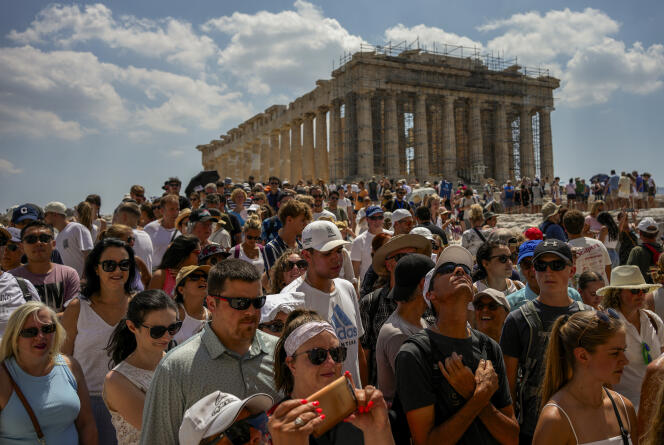


This summer, under sometimes scorching temperatures in Athens, tourists waited almost an hour before they can visit the Acropolis. Visitor numbers have jumped by 80% since 2019, according to the Greek Ministry of Culture. In July, up to 23,000 people a day climbed the hill of the famous site, according to the agency operating archeological sites. In early August, the ministry decided to make visits to Greece's most famous site regulated, starting in September. A maximum of 20,000 people will be able to climb the hill every day. According to the pilot project, between 8 am and 12 pm, 8,000 people divided into four groups will be able to visit the site; then, between 12 pm and 8 pm, up to 12,000 people divided into eight groups will be able to follow.
From Athens to the Greek islands, overtourism is becoming a headache for the Greek government, which is nonetheless delighted with the good health of a sector that accounts for 25% of the country's gross domestic product and employs one in five of the working population.
The fires that struck the country at the end of July, and in particular the tourist island of Rhodes, where images of hotel evacuations were relayed around the world, have certainly frightened the industry, which hopes not to suffer a negative impact in 2024, but throughout Greece, residents are increasingly rebelling against hypertourism. For several days now, a "towel movement" has been mobilizing from the island of Paros to Crete, calling for free beaches that are not privatized by bars or hotels with deckchairs and umbrellas.
A picture of Vroskopos Beach on the Cycladic island of Kea in Greece recently made the rounds on social media. On the left, it shows the deserted bay in July 2018, when it was only accessible via a small dirt road. The landscape on the right, captured in October 2022, looks quite different: 75 small houses under construction crowd the hill overlooking the beach, which is due to be transformed into a luxury hotel complex.
"This is what tourism development means for our country's natural landscapes," one Greek citizen fumed on Twitter. While most are delighted with the health of the tourism industry – which accounts for 25% of the country's gross domestic product and employs one in five working people – some are worried about the sector's explosive growth.
On Sifnos, the mayor has asked the government to step in to preserve his island. He proposed that measures be taken to prohibit the construction of swimming pools at a time when the Greek islands are often short of water, or to authorize only the construction of houses that respect Sifnos' traditional architecture.
You have 60.35% of this article left to read. The rest is for subscribers only.
